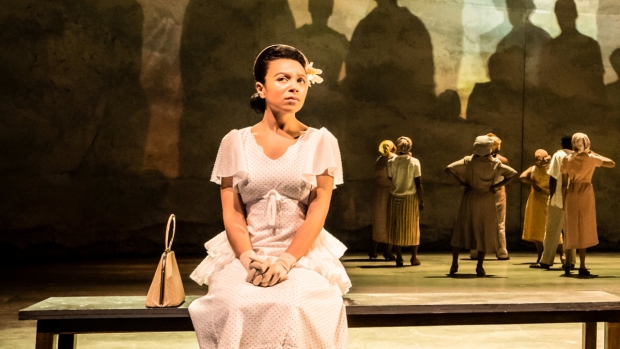Small Island returns to the National Theatre – review

© Johan Persson
The stage version of Andrea Levy's award-winning novel about the treatment of Britain's Black citizens in the wartime and post-war years was pretty fabulous when it first appeared in 2019. This revival with a new cast is utterly sensational – an engrossing, all-embracing piece of theatre.
The achievement of Helen Edmundson's adaptation and Rufus Norris's sensitive, fluent direction is that of all great art: it makes its points through its characters rather than by imposing arguments on top of them. An entire panorama of British post-colonial society is placed on the stage, in all its ugliness and prejudice.
But the people you spend three hours with, are fully-realised, with their faults, their humour, their resilience propelling the story as much as the great sweep of 1940s life. The big theme, still so pertinent today, is the distorting effects of Empire, of a belief in the right of Britain to rule, which meant that the Windrush generation were invited to come to this country from Jamaica and the West Indies and then saw their hopes of a better life cruelly dashed.
Yet there are smaller, gentler concerns that poke their way to the surface: the absolute unpredictability of love, the way that people long for others who can't make them happy, and the sense that generosity and kindness are the torches of the human spirit.
This is all embodied in the central quartet of characters: uptight Hortense, who loves her dashing cousin Michael, but who marries the irrepressible Gilbert in order to get to England. There, they all end up in the ambit of the landlady Queenie, warm and welcoming, and willing to rent her rooms to people of colour when her neighbours will not. She's married to the repressed Bernard, whose buttoned-up respectability conceals a welter of hatred.
Their stories unfold with gripping simplicity, as the scene moves from the golden light of Jamaica to the grey, grimy London streets. Katrina Lindsay's set, which uses window and door frames to suggest an entire life, is dominated by a curved panorama on which Jon Driscoll's projections paint the ever-changing scene, transforming swiftly from the moonlit skies of Hortense's childhood to cloudy Lincolnshire where Queenie grows up, to the bombed rubble of the capital.
This sense of movement, of a world being conjured in front of our eyes, is underlined by the grace of Coral Messam's movement direction, which keeps crowds with umbrellas or parasols constantly on the go, bustling round the edges of the central revolve. Sometimes a character appears – or case – disappears through a trap door. Sometimes bits of scenery revolve or – magically – the cast become part of the panorama, as when their silhouetted forms are shown climbing into the Windrush in 1948. Everything is beautifully underscored by Benjamin Kwasi Burrell's music and Ian Dickinson's sound design.
The examination of this society is subtle and fierce. There's a lot of humour – Gilbert's description of all British food as looking as if it has already been eaten once, Queenie's meeting with Bernard in her aunt's confectionery shop – and Jamaica, on the brink of independence, isn't painted as a paradise. But the racism when it arrives is sharp and shocking, with language so violent and unpleasant it chills and shames.
That it is Gilbert, who has fought for the motherland in the RAF, who bears the brunt of the attacks makes them even more unbearable. He glides through the story with such dignity and grace, lovable and funny when trying his moves on the girls, fierce and defiant when he is subjected to abuse. Leemore Marrett Jr makes him a man of substance but the way that you see his hopes of becoming a lawyer suddenly dying in his eyes is almost unbearable.
As the prissy Hortense, Leonie Elliott is equally heartbreaking. The fact that even Queenie can't understand the way she speaks English, when she is so proud of her elocution sums up the disillusion she feels as she watches the promise of a golden life seep away. As Queenie, Mirren Mack is a vivid, vibrant presence, eyes shining with tears as she too sees her dreams dashed, condemned to live with Martin Hutson's neurotic Bernard, a man she has nothing in common with.
Every member of the cast plays their part in this reminder that small islands can be in the mind, cutting us off from each other. It's a staggering achievement, a humane and pointed assertion that the story of Britain is the tale of its Black citizens as well as its white. As its emotional climax reminds us all, what is needed is pride, tolerance and love.










